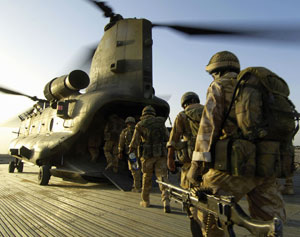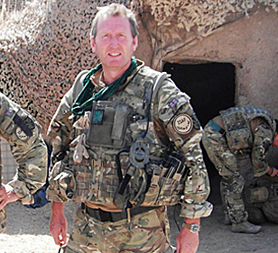Return to Afghanistan: anguish of impending deployment
“Should I be killed, this is what they will say about me”. Captain Doug Beattie, awarded the Military Cross for bravery in Afghanistan, writes for Channel 4 News on his return to the frontline.

My obituary goes something like this.
“Captain Douglas Ricardo Beattie MC was from Portadown in N Ireland, had a wife, two children and a grandson, and had spent 28 years in the military. He died a Ranger serving with the soldiers he loved helping the people of Afghanistan.”
Should I be killed in some foreign field then this is what the Ministry of Defence (MoD) will say about me. I know this because I have already written these few words to accompany news of my passing. The MoD has a form for this sort of thing and I have filled it out.
My musings will be followed by a series of platitudes from those who knew me well, or thought they knew me, all repeating what a great guy I was. My name will be added to the lengthening list of those members of the British Army who went to Helmand and didn’t come back; talked about and thought about only until the next soldier dies.
Those left behind
As the headline writers move on to other topics it will be up to my wife Margaret to pick up the pieces and get on with her life; on her own.
Should I be killed in some foreign field then this is what the Ministry of Defence will say about me.
I am not proud to say this is something she is used to. During two decades of marriage we have spent more time apart than together, with me constantly rushing off on one military adventure or another whilst she runs the rest of our life and looks after our family.
As well as my partner she is my only true friend and personal assistant. With the man of the house away playing soldiers, she has to wear the trousers – pay the bills, service the car, celebrate the birthdays, carve the joint, plan for a future which may or may not include me.
Margaret knows where the life insurance is. She knows how I would want my funeral conducted. She can lay her hands on the will. But after the ceremony and the mourning, when the door shuts firmly behind her and she is alone it will be of absolutely no consolation to her to know I died “doing what I wanted to do, making a difference to the people of Afghanistan” instead of by her side, an old man.

Back to Afghanistan
The people of Afghanistan? she will be thinking. What about me? What about my life; our family? And she will be right to ask these things.
When I arrive in Camp Bastion, it won’t be for the first time. Or indeed, the second. But the third. And it’s not as if I have been forced to go. After a lifetime of soldiering I could have retired after my initial tour of Helmand back in 2006.
However I didn’t.
I had another chance to hang up my rifle following the 2008 deployment. But no.
And now – despite the repeated promises I made never to return, never to leave Margaret again – I’m making it a hat-trick. At first glance it seems as if I have been lying to myself and lying to her. But it is more complicated than that.
My attitude and my perspective shift on a constant basis. My wife is the most important person on earth to me. That she has stood by me over all these years is a great testament to her and a great fortune for me. I am the one who wears the medals but they should belong to her. It is the families of service personnel who should be recognised for their suffering and resilience, but there is no one to write them up for their awards and hence no public acknowledgement of what they do and what they tolerate.
The worst-case scenarios constantly emerge from the murk, increasingly so as the time to depart looms nearer.
Honour and glory
There have been many points when I truly believed I had reached the end of the soldiering road. As friends and colleagues were injured – or worse – I prayed for deliverance and the chance to return home in one piece.
Yet as the danger passes and the anguish subsides, so the romance takes hold again.
I can see nothing but honour and glory, the good I believe is being done in Afghanistan pushing the risks into the shadows.
Of course the worst-case scenarios constantly emerge from the murk, increasingly so as the time to depart looms nearer; stepping on an IED, being caught in the cross-hairs of the Taliban sharp shooter who has been making the headlines, being turned on by the Afghan forces we are supposed to be partnering.
‘There has to be a point’
But I try and banish these thoughts back to whence they came. I have to go to Afghanistan; after all, I argue, there is a job still to be done and I am needed to do it. The mission will grind to a halt without me.
I’m no small cog in a big wheel. Why would I put myself through it if I thought myself anything other than critical to events? What would be the point? There has to be a purpose. I cannot be just another anonymous soldier in 10,000, and as I say that I know that every soldier will say the same and should say the same.
After all our lives are as important as any Colonel or General. At least to me and
Margaret.
What really looms over me though is not my imagination, but my memory.
For more on the conflict in Afghanistan visit the Channel 4 News special report
In 2006 I was sent to ‘Afghan’ to work behind a desk. I wasn’t supposed to be fighting. But that soon changed. I ended up battling for 14 days to recapture the town of Garmsir. I watched men die in front of me, took lives, thrust a bayonet through the neck of an enemy fighter.
Two years later and I was supposed to be doing another desk job. Once more reality intervened and I found myself at the sharp end: Kajaki, Lashkah Gar, Marjah, the upper Gereskh valley.
Over 50 serious contacts with the enemy later and I emerged just about unscathed, having already made my pledge not to go back.
I cannot be just another anonymous soldier in 10,000, and as I say that I know that every soldier will say the same and should say the same.
Fear of return
Yet here I am, preparing to go again, because the truth is, I can actually see a way over the impregnable barrier. For just as I manage to convince myself I am the most important part of the British Army, so do I believe I am invincible. I will make it through.
Such is my confidence that I have not written a final letter for Margaret. My bland public obituary yes, but not a deeply personal note for my wife. I don’t have to tell Margaret how I would like to be remembered because we can talk about it when I come home.
The night before I go, standing before the mirror in the bedroom, I feel numb. My mood has been swinging; the excitement of what lies ahead tainted by uncertainty and fear for my family.
Returning is proving incredibly difficult, the countdown to my departure overshadowing every moment spent with my family. It is as if we are collectively looking at the giant clock advancing towards the most difficult of moments.
I take one last look at myself. My hair has been cut far too short; the clippers that rid me of my grey streaks have also exposed just how patchy my thatch really is. I suck in a little bit of the extra weight still hanging around my middle. No time now for that final run I was going to fit in before the off.
Saying goodbye
I am adjusting my jacket as Margaret comes out of the bathroom. She is dressed to kill. If ever I needed prompting as to why I married her then here it is. We’re going out tonight.
There will be tears, moments of melancholy and sadness, but it won’t be a final farewell just as the meal won’t be our last supper.
When I head down the garden path in the morning I will take every opportunity to stop, turn and look at Margaret, her gentle crying trying to reel me in, and it will take every ounce of strength I have to resist.
I know that if I were to sneak back 20 minutes later she would still be standing there, waiting for the nightmare to end, waiting for me to return with the paper and a pint of milk. After a 28-year military career and all the goodbyes – so many I need all my fingers and a fair few toes to count them – the act of leaving does not get any easier.
And nor should it, because what I do, what all my comrades do, is no light matter. Not for us and certainly not for our loved ones. Without their support where would we be?
But that’s for tomorrow though. Now, I’m taking my wife out. I raise my head and smile broadly at the woman I love; trying to remind Margaret of all the reasons she married me.
Captain Doug Beattie MC of 1 Royal Irish Regiment is currently deployed in Southern Afghanistan. He is the author of An Ordinary Soldier and Task Force Helmand.